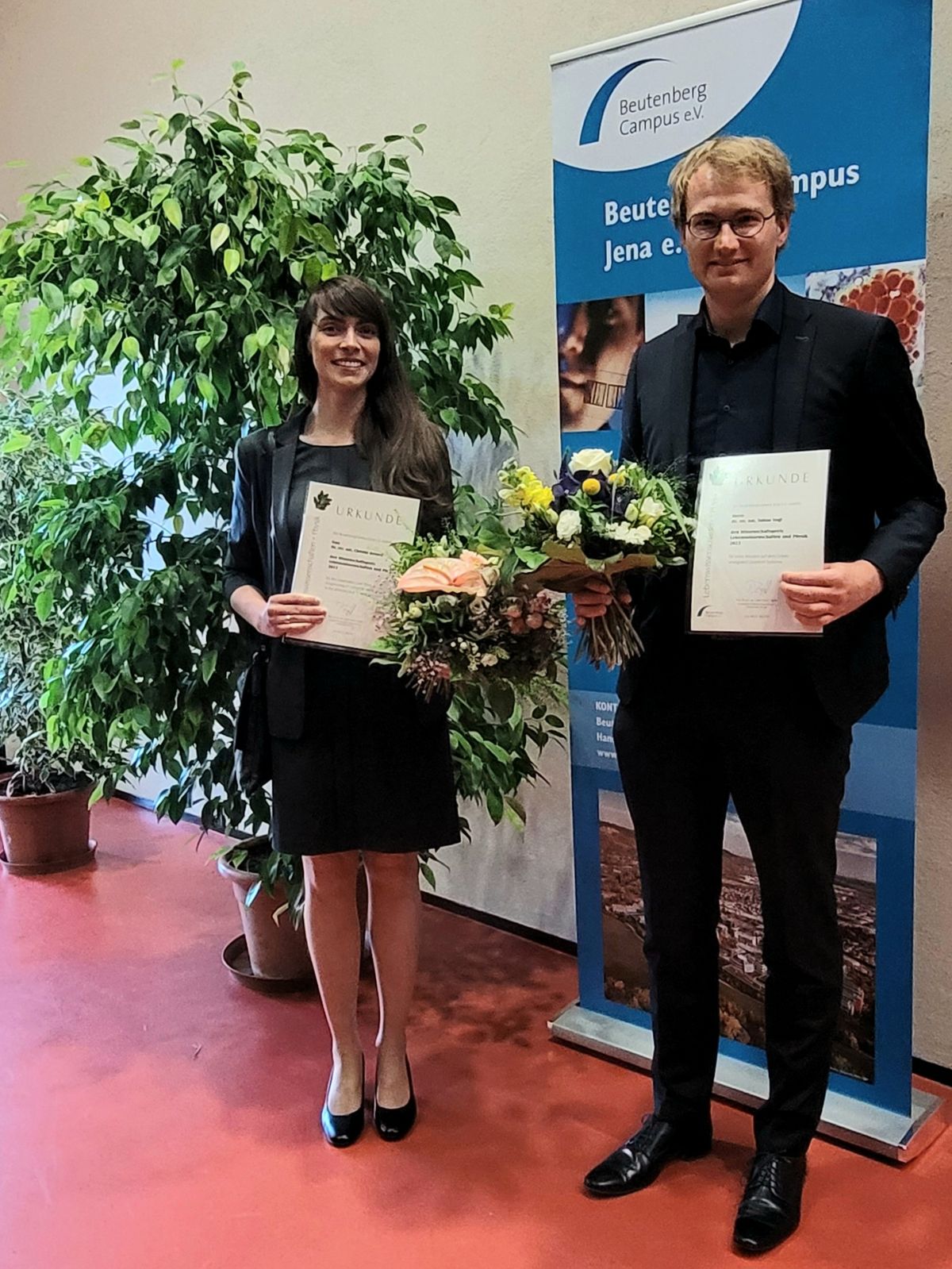Jena (Germany) | May 26, 2023
Science Award for Dr. Tobias Vogl
Researcher awarded young scientist prize by Beutenberg Campus Jena e.V.
Dr. Tobias Vogl has been awarded the "Young Scientist Award" 2023 of the Beutenberg Campus Jena e. V. for his outstanding scientific work. In his research, the physicist has been dedicated to quantum technologies for many years. With great success, he now heads the independent research group "Integrated Quantum Systems", which is based at the Institute of Applied Physics at Friedrich Schiller University Jena and the Fraunhofer Institute for Applied Optics and Precision Engineering IOF.
The Beutenberg-Campus Jena e.V. has been awarding science prizes once a year since 2005 to honor outstanding research work by young scientists at the Beutenberg Campus related to the campus guiding principle "Life Science meets Physics". As part of the public lecture series "Noble Gespräche (engl.: "Noble Talks"), the Beutenberg Campus Jena e.V. honored the best young researchers at the Beutenberg Campus on May 25. This year, Dr. Tobias Vogl was awarded the science prize in the category "Young Scientist Award".
Dr. Tobias Vogl is head of the research group "Integrated Quantum Systems", which is based at the Institute of Applied Physics (IAP) and the Fraunhofer Institute for Applied Optics and Precision Engineering IOF, and has been recognized for the extraordinary quality of his scientific work, which he can already demonstrate despite being only 31 years old: In addition to an acquired third-party funding volume of more than 7.5 million euros, a high number of publications in renowned journals, such as Nature Physics and Nature Communications, he currently supervises eight PhD students, three master's theses and guides two postdocs. In addition, Vogl is also involved in teaching at the Faculty of Physics and Astronomy.
Via Australia to Jena
After his studies at Ludwig-Maximilians-Universität in Munich and a PhD in quantum optics at the Australian National University, Tobias Vogl joined the University of Jena as a postdoc in 2019. During his PhD, he developed room temperature quantum emitters made of the 2D material hexagonal boron nitride and optimized them for use in advanced quantum technologies. To investigate potential applications, the emitters were coupled directly to optical fibers (e.g., for quantum networks). Probably the most important work is the coupling of an emitter to a microresonator.
The physicist integrated this resonator-coupled light source into a prototype small satellite. The aim was not only to ensure the radiation tolerance of quantum emitters for e.g. satellite-based quantum communication. Rather, 2D materials in general were qualified for use in space. "These include, for example, atomically thin field-effect transistors that could make future satellite electronics more efficient and lighter," he elaborates on Prize 2023.
International networking and successful acquisition of third-party funding
In his first year as a postdoc in Jena, Vogl already solicited an independent DFG project to develop a novel excitation mechanism for single-photon sources and explore their use in quantum cryptography. In 2020, he began building an international research consortium with the goal of advancing the single photon source for a global quantum internet. "By setting up and coordinating such a research network, Mr. Vogl has achieved in his very young career what is usually reserved for senior researchers with many years of experience," explains Prof. Dr. Stefan Nolte, deputy director of Fraunhofer IOF. For his concept of optical quantum logic on a satellite, Tobias Vogl has further received the INNOspace Masters Award of the German Aerospace Center in 2021, which is endowed with 400,000 euros.
In 2022, Vogl has also acquired a junior research group funded by the BMBF, single photon emitters in 2D materials combined with integrated optics. "This makes it possible to miniaturize complete quantum optical setups, which we previously realized on lab benches, into small quantum photonic chips," he explains. These nanoscale quantum sensors are very compact and yet work more precisely than currently available solutions. As a result, they have enormous potential for use in the life sciences. The magnetic field sensors could improve the precision and resolution of medical magnetic resonance tomographs and be used as mobile devices in an ambulance, for example.
Tobias Vogl also specifically acknowledges the environment at Jena's Beutenberg Campus as the basis for his successful research work: "The 'photonic ecosystem' in Jena and especially here at the Beutenberg made these research achievements possible for me and my team," says the award winner. "It is a special place with fertile ground."
Presentation of the Young Talent Award during the "Noble Gespräche"
The science prizes of the Beutenberg-Campus Jena e.V. were awarded during the "Noble Gespräche" on May 25. The awards were presented by the chairman of the association, Prof. Peter Zipfel. In addition to Dr. Tobias Vogl, Dr. Christin Reimer from the Leibniz Institute for Natural Product Research and Infection Biology - Hans Knöll Institute was awarded for the best dissertation of the past year. Both prizes are endowed with 1,000 euros.
